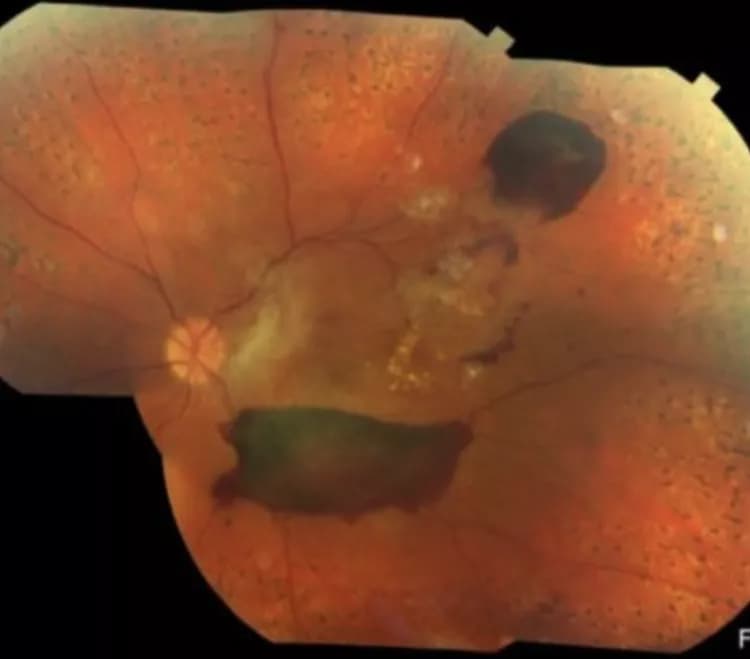
Diabetic Blindness: Protein That Plays Key Role
For millions of Americans, their world is dissolving into an unrecognizable blur. Diabetic retinopathy is an eye disease affecting one-third of the estimated 30 million Americans who struggle with diabetes. As the patients' vision slowly fades, it never recovers and few treatments are available.
Researchers at University of Utah Health have identified a protein (ARF6) that when inhibited reduces diabetic retinopathy, a condition that results when blood vessels at the back of the eye leak fluid into the eye, impairing vision. Published in the October 23 issue of The Journal of Clinical Investigation, these results offer an opportunity to develop new treatments for this eye disorder.
"What is exciting about this study is that we and our collaborators identified a compound (NAV-2729) that inhibits ARF6, which is crucial for the development of diabetic retinopathy," explained co-first author Weiquan (Wendy) Zhu, Ph.D., research assistant professor in Internal Medicine at U of U Health.
Studies were conducted in rodents treated to simulate the diabetic condition. By injecting NAV-2729 into the eyes of these animals, vessel leakage, as well as, the overgrowth of blood vessels, another driver of disease, were significantly reduced.
The long-term efficacy of treatment remains unknown. It also remains to be determined whether the drug will be suitable as a therapeutic intervention for people.
"ARF6 acts like a traffic cop at a busy intersection within a cell," explained Dean Li, Ph.D., vice president, Head of Translational Medicine at Merck & Co. and senior author on the paper. Li is the former associate vice president and chief scientific officer at U of U Health and co-founder of Navigen Inc. "ARF6 orchestrates multiple inflammatory signals that contribute to inflammation common in many diseases, including diabetic eye disease."
ARF6 amplifies and maintains the signal protein (vascular endothelial growth factor (VEGF)) receptor, which stimulates a series of cascading responses, leading to a diseased state in the eye.
Today, patients with diabetic eye disease can receive monthly anti-VEGF injections directly into the eye to reduce inflammation, a treatment that is successful in only 40 percent of patients. In the study, injections of NAV-2729 into the eyes of diabetic mice were more effective in reducing blood vessel leakage than the anti-VEGF injections.
"Diabetic retinopathy can develop over time, leading to dramatic vision loss that may not be improved with glasses," said M. Elizabeth Hartnett, M.D., professor in Ophthalmology and Visual Sciences at Moran Eye Center and a contributor to this study. "New treatments are needed, because diabetic retinopathy is increasing world-wide and anticipated to increase more in the next decades."
Also new to this study, the researchers identified two proteins ? GEP100 and ARNO ? that play a critical role in the signaling process. These proteins activate ARF6 at two different locations in the cell to continue the signaling cycle.
"We think these results are important because they identified a mechanism by which ARF6 controls VEGF receptor signaling and therefore may have much broader implications, extending to other diseases that involve VEGF receptor activation, such as cancer," said Shannon Odelberg, Ph.D., research associate professor in Internal Medicine at U of U health and corresponding author on the study.
According to Odelberg, ARNO activates ARF6, which shuttles the VEGF receptor into the cell where its signal can be amplified. GEP100 activates ARF6 to recycle the VEGF receptor back to the outside of the cell where it can be reactivated for the signaling process to begin again. This signaling loop triggers disease by increasing blood vessel leak and the formation of new and weak blood vessels.
The team of researchers plan to continue to explore the role of ARF6 in other inflammatory diseases.
NAV-2729 was identified by A6, a subsidiary company of Navigen Inc, a Salt Lake City drug discovery and development company, whose research scientists contributed to this study. According to Zhu, A6 researchers are pushing forward with development of other compounds, which are more suitable as potential new treatments.
Materials provided by University of Utah Health. Note: Content may be edited for style and length.
Disclaimer: DoveMed is not responsible for the accuracy of the adapted version of news releases posted to DoveMed by contributing universities and institutions.
References:
Weiquan Zhu, Dallas S. Shi, Jacob M. Winter, Bianca E. Rich, Zongzhong Tong, Lise K. Sorensen, Helong Zhao, Yi Huang, Zhengfu Tai, Tara M. Mleynek, Jae Hyuk Yoo, Christine Dunn, Jing Ling, Jake A. Bergquist, Jackson R. Richards, Amanda Jiang, Lisa A. Lesniewski, M. Elizabeth Hartnett, Diane M. Ward, Alan L. Mueller, Kirill Ostanin, Kirk R. Thomas, Shannon J. Odelberg, Dean Y. Li. (2017). Small GTPase ARF6 controls VEGFR2 trafficking and signaling in diabetic retinopathy. Journal of Clinical Investigation. DOI: 10.1172/JCI91770
Related Articles
Test Your Knowledge
Asked by users
Related Centers
Related Specialties
Related Physicians
Related Procedures
Related Resources
Join DoveHubs
and connect with fellow professionals

0 Comments
Please log in to post a comment.